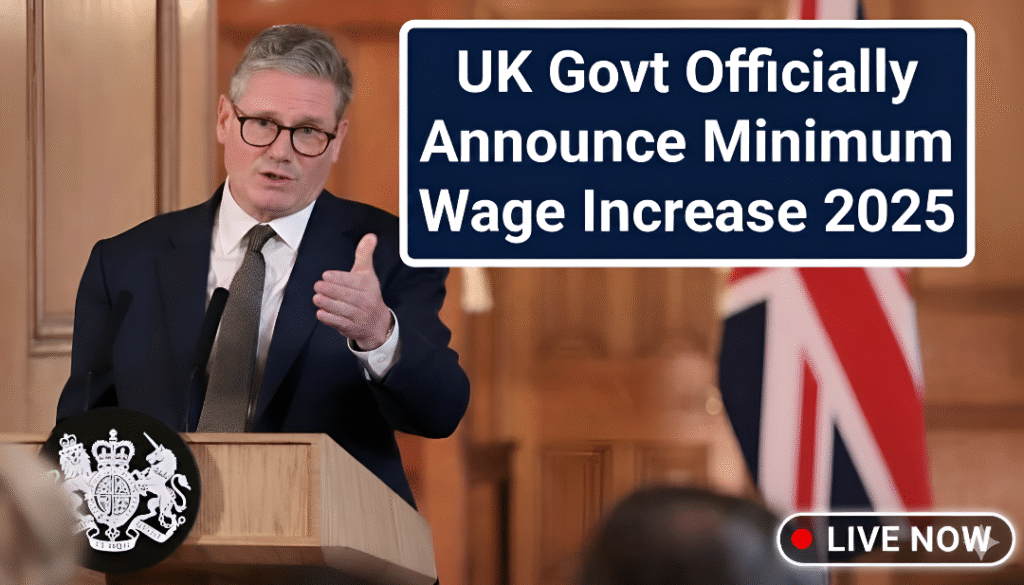The UK Government has officially announced a major Minimum Wage Increase for 2025, and the new hourly pay rates will come into effect from 25 November 2025. This update is one of the most important financial changes for millions of workers, especially young employees, apprentices, and low-income households. The increase aims to support the rising cost of living, improve employee welfare, and ensure fair compensation across industries. With the new wage structure, both workers and employers must understand how the updated rates will impact jobs, income, and business operations across the UK.
UK Minimum Wage 2025 New Rates Effective from 25 November 2025
The UK Government has confirmed that the new 2025 Minimum Wage rates will apply to all eligible workers from 25 November 2025. These updated wages will increase take-home pay and offer better financial protection to workers. The wage structure applies across different age brackets and job categories, ensuring a fair earning environment.
UK Minimum Wage 2025: New Hourly Pay Rate List
The following are the newly announced hourly wage rates for 2025:
- National Living Wage (21+ years): £12.20 per hour
- Ages 18–20: £9.10 per hour
- Ages 16–17: £7.10 per hour
- Apprentice Rate: £6.60 per hour
- Accommodation Offset: £9.90 per day
These new wage rates are designed to improve salaries at every level while balancing employment growth in the UK job market.
UK Minimum Wage 2025: Why the Government Increased the Wage
The UK Government increased the Minimum Wage 2025 due to rising living costs, inflation pressure, and demand for better pay among lower-income workers. According to the official Labour Market Analysis, wage growth was essential to maintain financial stability for millions of UK employees. The government aims to reduce income inequality and support workers in sectors like retail, hospitality, security, cleaning, and transportation.
Impact of UK Minimum Wage Increase 2025 on Workers
The new wage policy will significantly benefit workers across the UK. Employees earning the minimum wage will see a clear rise in their monthly and annual income. This increase will help workers manage expenses related to housing, energy bills, groceries, transportation, and education. The pay hike will especially support young workers and apprentices who have been financially affected by inflation in recent years.
Impact of UK Minimum Wage Increase 2025 on Employers
While the wage increase benefits workers, it will also affect employers who must adjust salary budgets and operational costs. Businesses in retail, hospitality, cleaning services, and logistics may face increased wage expenses. However, the government believes that better pay will improve job satisfaction, reduce staff turnover, and enhance overall productivity. Companies are encouraged to plan early to accommodate the new wage structure starting 25 November 2025.
UK Minimum Wage 2025: Comparison with Previous Year
Compared to 2024 rates, the 2025 Minimum Wage increase is one of the most significant adjustments in recent years. For example, the National Living Wage for workers aged 21+ has increased from £11.44 to £12.20, offering noticeable financial relief. Younger workers and apprentices also receive strong wage improvements, ensuring fair workplace compensation.
Who Will Get the UK Minimum Wage 2025 New Rates?
The new Minimum Wage 2025 applies to:
- Full-time workers
- Part-time workers
- Casual labourers
- Apprentices
- Temporary or seasonal workers
- Workers employed through agencies
Every employer in the UK must follow these new regulations from 25 November 2025.
UK Minimum Wage 2025: Key Points Every Worker Should Know
- New rates start on 25 November 2025
- Employers must update payroll as per law
- Workers cannot be paid less than the new minimum wage
- Apprentices get a separate revised hourly rate
- Employers failing to comply may face legal penalties
Understanding these points ensures workers receive the correct earnings under the new rules.
Conclusion – UK Minimum Wage Increase 2025
The UK Government’s official announcement of the Minimum Wage Increase 2025 is a major step toward supporting financial stability and worker rights across the country. With the new hourly rates beginning from 25 November 2025, millions of UK employees will benefit from higher earnings and improved living conditions. Both workers and employers should stay updated with the guidelines to ensure full compliance with the new wage structure. This positive change is expected to boost the economy, strengthen workforce satisfaction, and enhance overall job quality in the UK.
